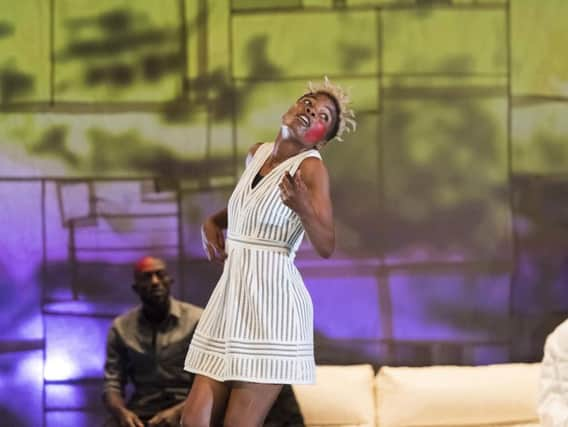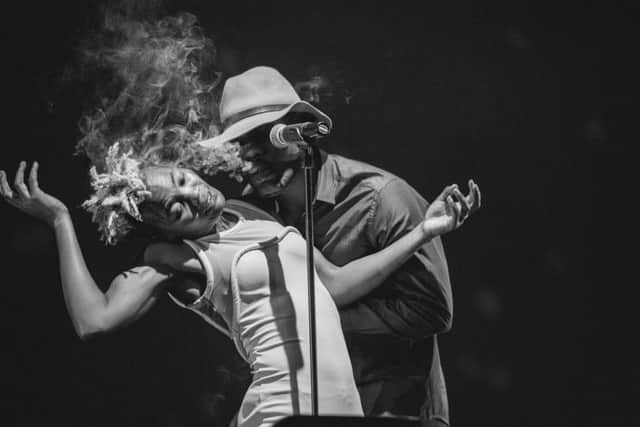Serge Coulibaly Interview: 'Where I come from, you need to give everything you can to whatever you’re doing'


Serge Aimé Coulibaly is not an easy man to forget. On stage, his body moves as if he couldn’t stop even if he wanted to; dancing with a loose-limbed energy that keeps drawing your eye back for more. Off-stage, it’s his laugh that grabs you. Loud but never grating, quick to arrive but always real – and often in response to his own words, yet never arrogant.
As the crowd flocks out of London’s Barbican Centre after a rousing performance of Kalakuta Republik, the air is thick with compliments about what we’ve just seen. When I relay this to Coulibaly later backstage, it’s greeted with genuine pleasure and, of course, a big laugh. “Ah, that’s great to hear,” he says. “Because you never really know – at the end of the performance they always clap… ”


Advertisement
Hide AdCoulibaly’s company, Faso Danse Théâtre, is based in his birthplace of Burkina Faso but also in his adopted European homes of Belgium and France. A situation that reflects his own artistic journey, from a childhood in Africa dancing to Michael Jackson videos and breakdance films, to performing with two of contemporary dance’s biggest names, Alain Platel and Sidi Larbi Cherkaoui.
It’s a life and career that has shaped the 47-year-old, both creatively and politically. “When you come from a country like Burkina Faso,” he says, “where food, water, medicine and education are priorities, and then you choose to be a dancer, what kind of dancer can you be? For me, the work has to kind of be life and death. And that’s what I ask of my dancers, right at the start I say to them if this work is not life and death for you, maybe change jobs. Because where I come from, you need to give everything you can to whatever you’re doing.”
The same could also be said of Fela Kuti, the Nigerian musician, composer and activist who inspired Kalakuta Republik. Known for his part in creating the Afrobeat sound, Kuti was also an outspoken critic of the Nigerian government and military. In the early 1970s, he declared the compound in Lagos that housed his family, band members and recording studio as being independent from Nigeria, calling it the Kalakuta Republic.
Swapping the ‘c’ in Republic for a ‘k’, Coulibaly created a show that is in no way a biography of Kuti’s life. Instead it shares the spirit, energy and passion for change that propelled Kuti to keep speaking out, even when his words brought countless arrests and incarceration.
“My first knowledge of Fela came in 1986 when I was 14,” recalls Coulibaly. “He was invited to Burkina Faso by the President, and every day on TV during the visit they showed Fela and his music. At 14 I didn’t really understand – I was more a fan of Michael Jackson.” But in 2006, Coulibaly discovered Music is the Weapon, a short film about Fela and his fight against the government.
“I totally fell in love with it ,” he says. “I thought that’s what artists should be doing in Africa, fighting against the system to help the common man. That film became like a bible to me – I’d show it to the dancers and say ‘see this guy, it’s really life and death for him’. Because they’d put him in jail, and he’d just carry on.”
Advertisement
Hide AdCoulibaly admits there are less admirable aspects of Kuti’s life that he’s “not a fan of” (Kuti’s 27 wives for starters) but says with a laugh, “I choose the sides of him that I love and I connect with those.”
Along with Music is the Weapon and the documentary film Finding Fela, Coulibaly’s research also involved travelling to Lagos to speak with Fela’s family and friends. But a big impetus for creating the piece came from political developments in Burkina Faso in 2014 when, after 27 years in power, President Blaise Compaoré finally resigned.
Advertisement
Hide Ad“I wanted to create an homage to engaged artists and activists,” explains Coulibaly. “Because after what happened in 2014, youngsters took to the street and there was an uprising, like a revolution. And at the front of these people, were artists – a rapper, reggae people, myself choreographing a piece called Sleepless Nights In Ouagadougou, about how youth can take the power.
“And then one of the rappers, who is also an activist on the frontline, was persecuted and had his studio bombed. After that I thought, what is our role in society? And Fela set an example back then, so I thought I would take him as the inspiration and make a piece.”
When Kuti declared his home an independent republic, it was so he could do anything he wanted there. Coulibaly decided to follow suit with his show: “I just changed the c to a k, and that meant on stage, we could do anything we wanted.” This is accompanied by the biggest laugh of our whole conversation – and it’s easy to see why. Kalakuta Republik has a sense of joyous anarchy about it, particularly in the second half, when it feels like all bets are off and the performers can do whatever they like.
During the first half, the dancing never stops. At first you assume things will slow down and the music being played will come to an end. But it doesn’t – Kuti recorded a 30-minute track and it’s played in its entirety here. After the interval, the neat monochrome set gets colourful and messy; chairs are thrown, white powder covers the furniture and what Coulibaly calls a “wildness” takes hold.
According to Coulibaly, there’s no need to replicate Kuti’s actions in this show – Kuti already did that. Kalakuta Republik is about the here and now, the lives of the artists performing it and the world we’re all living in. If at times the action feel pushed to extremes, it’s because that’s what Kuti did. “Fela fought to the end,” says Coulibaly. “And that’s what we do with this show, we take an idea and explore it to the end.”
Lyceum, 8-11 August